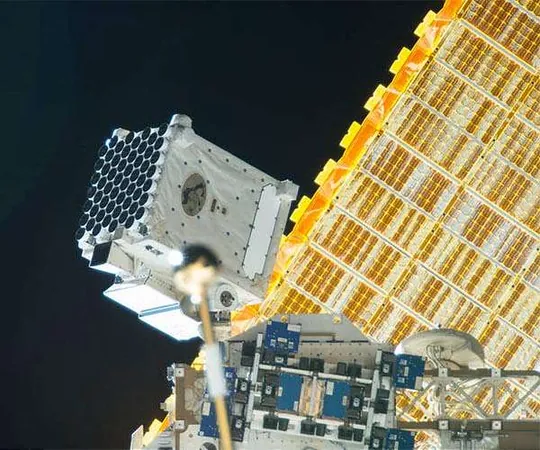
ISS Crew Gears Up for Groundbreaking Spacewalks and Pioneering Scientific Research
2025-01-07
Author: Nur
Spacewalk Preparations: A Leap Towards Advancement
This month, NASA astronauts are set to exit the Quest airlock for a historic spacewalk that will involve the maintenance of two key astrophysical instruments stationed on the ISS's exterior. First on the agenda is the Neutron star Interior Composition Explorer (NICER) X-ray telescope. This vital instrument will receive a protective cover to shield it from detrimental sunlight, ensuring the integrity of the research data collected. NICER plays a crucial role in the quest to understand neutron stars, the densest observable entities in the universe, by meticulously measuring their X-ray emissions.
Next, astronauts will focus on the Alpha Magnetic Spectrometer (AMS), a sophisticated particle physics experiment designed to analyze cosmic rays while searching for dark matter and antimatter. During the upcoming spacewalk, crew members will prepare AMS for pivotal upgrades planned later this year, ensuring its continued relevance in unraveling the universe's fundamental makeup.
Commander Suni Williams, along with Flight Engineers Nick Hague, Don Pettit, and Butch Wilmore, are diligently organizing tools inside the Quest airlock and fine-tuning their skills in using jetpacks, known as Simplified Aid for EVA Rescue (SAFER) units. These handy devices serve as safety mechanisms, allowing astronauts to return to the station should they lose their tether. The team is rigorously reviewing their spacewalk protocols to guarantee a successful mission.
Scientific Research and Innovations
Beyond their spacewalk preparations, the ISS crew is engaged in myriad scientific experiments. Flight Engineer Don Pettit is particularly focused on the Columbus laboratory module, where he’s nurturing Red Romaine lettuce seedlings. This research is not just mere agriculture; it's a critical step towards developing viable food sources for future extended missions, enhancing astronaut health and sustainability.
The ISS remains an unparalleled platform for scientific inquiry, spanning disciplines from fundamental physics to cutting-edge technology demonstrations, all contributing to valuable advancements for life both on Earth and in future missions to far-reaching galaxies.
Cargo Operations: The Lifeline of the ISS
Flight Engineer Butch Wilmore has been actively involved in managing cargo operations, efficiently transferring supplies and equipment between the ISS and the Cygnus cargo spacecraft, which has been docked since August 6, 2024. This streamlined cargo management is essential for supporting the crew's scientific experiments and maintaining station operations.
Roscosmos Crew Contributions: International Collaboration
The ISS is also home to three dedicated Russian cosmonauts who are immersed in vital scientific and maintenance work. Flight Engineer Aleksandr Gorbunov is particularly engaged in photographing microorganisms as part of a space biology experiment, shedding light on how the unique microgravity environment alters microbial behavior.
Flight Engineer Ivan Vagner is busy transferring water and supplies from the Progress 90 resupply ship, which successfully docked on November 23, while Flight Engineer Alexey Ovchinin is meticulously inventorying hardware across various modules, ensuring equipment is accounted for and in optimal condition.
The collective efforts of this international crew onboard the ISS underscore the station's invaluable role in propelling forward scientific understanding and preparing for ambitious exploration missions, fueling humanity's insatiable thirst to unlock the mysteries of the cosmos. Will this year be the turning point for groundbreaking discoveries? Only time will tell!

 Brasil (PT)
Brasil (PT)
 Canada (EN)
Canada (EN)
 Chile (ES)
Chile (ES)
 Česko (CS)
Česko (CS)
 대한민국 (KO)
대한민국 (KO)
 España (ES)
España (ES)
 France (FR)
France (FR)
 Hong Kong (EN)
Hong Kong (EN)
 Italia (IT)
Italia (IT)
 日本 (JA)
日本 (JA)
 Magyarország (HU)
Magyarország (HU)
 Norge (NO)
Norge (NO)
 Polska (PL)
Polska (PL)
 Schweiz (DE)
Schweiz (DE)
 Singapore (EN)
Singapore (EN)
 Sverige (SV)
Sverige (SV)
 Suomi (FI)
Suomi (FI)
 Türkiye (TR)
Türkiye (TR)
 الإمارات العربية المتحدة (AR)
الإمارات العربية المتحدة (AR)